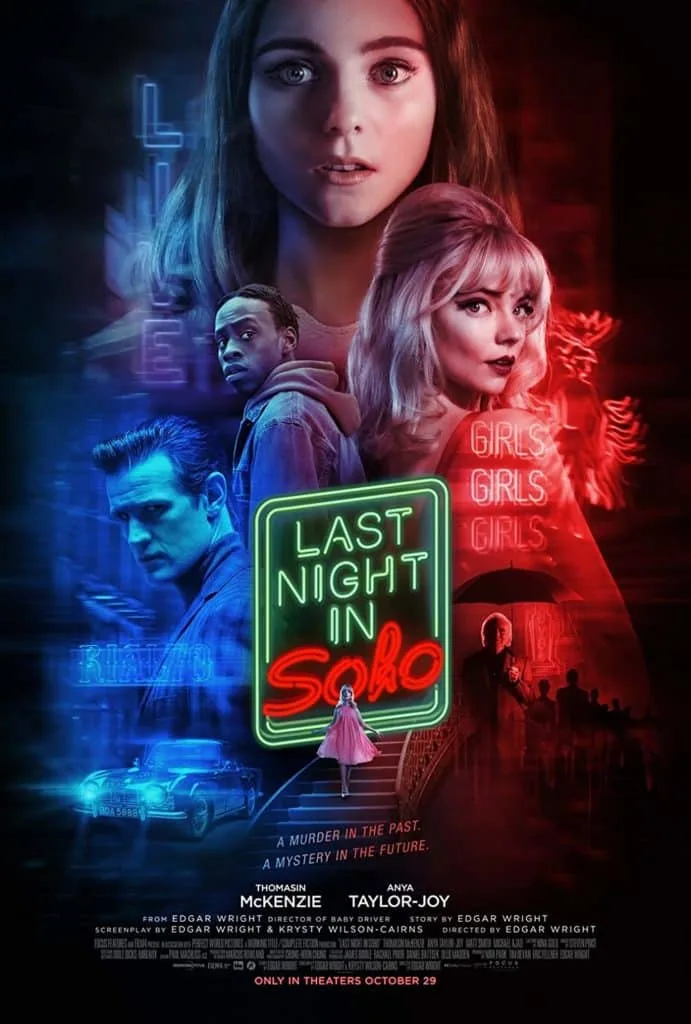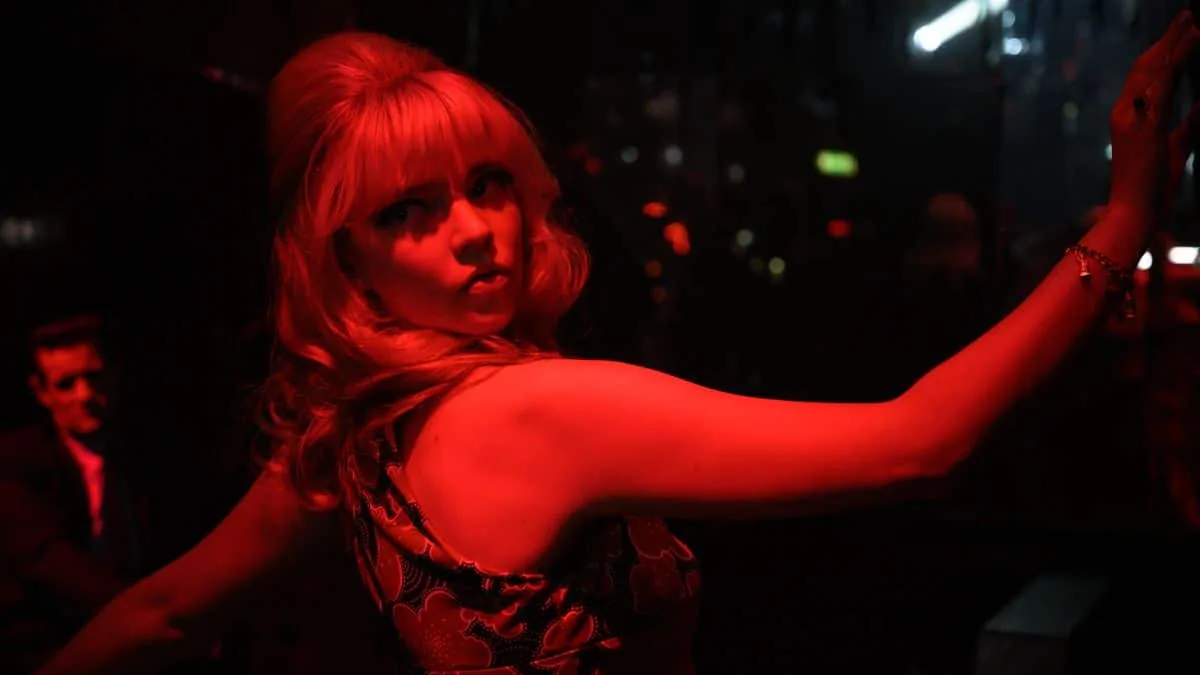
There’s already been abundant proof of Edgar Wright’s love of horror, but his most recent film, Last Night in Soho, changes tack from what we may have seen already; it’s a ghost story, but it pushes at the boundaries of what a ghost story can be; it’s a kind of 60s-glam spin on The Mezzotint in some respects, and a very modern, hardline assault on selfhood in others. Or, is a time travel story? Perhaps finally it’s a cautionary tale about wallowing in nostalgia which is not your own, or at least, the perils of living vicariously. All in all it’s a fascinating and engrossing story and whilst some aspects of the plot are laid on rather thickly at first, it’s so carefully constructed and paced that you want to go wherever it takes you.
The psychically-sensitive Eloise (Thomasin McKenzie) has inherited her gran’s tastes in music, fashion and cinema; when she receives news that she has been accepted into the London College of Fashion, she’s thrilled and can’t wait to take her 60s inspirations away with her. We know that she lost her mum at a young age; she sees her, sometimes, and feels her mum’s approval. Batting away grandma’s concerns about London as a kind of entity which swallows people up, Ellie moves out, very excited for her future. Needless to say, this rather naïve young girl should have listened to her gran (Rita Tushingham). A few crude encounters later – with a pervy taxi driver who jokingly tells her he’s going to lurk around her Halls of Residence and stalk the girls living there (!) and her wonderfully awful, if cartoonish new roommate Jocasta (Synnove Karlse) – and suddenly Ellie isn’t so sure about big, bad London. She soon makes the decision to find somewhere else to live and happens upon a dated little bedsit not too far away: it’s perfect. The landlady, Miss Collins, is a bit of a stickler, but that suits Ellie just fine. She begins to feel like she could do this.
Once she has moved in to her new place, though, Ellie begins having odd visions – lucid dreams of the old Soho, a world which looks almost impossibly glamorous and classy. In this, her aesthetic paradise, she sees the reflection of a young woman about her own age and begins to follow her; she is in awe of her confidence and charisma, finding her incredibly aspirational as she charms her way into the life of a club booker called Jack (a dapper Matt Smith) and, seemingly, commences a career as a singer. But the girl – Sandie (Anya Taylor-Joy) – is not on the trajectory that Ellie first supposes she is. Soon, Ellie’s visions are intrusive rather than tantalising, and they begin to crowd out her real life, tentative as it already is. Ellie no longer feels like a bystander, and feels somehow that she has to find out what happened at the end of the story which she has, to some extent, been living.

The beginning of the film has some very clunky male characterisation which feels like it has taken on the message of #MeToo and run amok with it, though thankfully later developments balance this out. The instant addition of the bad man in the taxi and some of the godawful men Sandie encounters in her life, for instance, are eventually balanced out by a screenplay which begins to weave something far more considered out of its initial elements. Last Night in Soho is at its best once it has established its key players and plot points and is then in a position to weave everything together in a fascinating way, with surprises and developments which encourage viewers to think again about what they’ve seen. The little visual link-ups, and the use of references which make new sense in light of something we’ve already been shown are truly skilled, subtle and effective – far more skilled, subtle and effective than any number of ‘Easter egg’ type packages beloved of lesser screenwriters and directors, whilst showing a level of trust in the audience to understand and appreciate them. And, at the risk of wallowing in nostalgia which is not my own, either, 60s Soho looks absolutely phenomenal: it’s rendered incredibly well, it makes for a superb backdrop to the story and it’s every inch the gorgeous fantasy. Note the addition of photo comparisons with London now, which use some particularly unflattering shots taken during Covid lockdown, but make their point. Doesn’t it look soulless, lonely? No wonder Ellie gets drawn in to the old Soho, however brutal and malign it is beneath the surface.
The performances here are solid, with McKenzie offering up a suitably blank slate character at first, one who runs the gamut of emulation and self-determination. Anya Taylor Joy is really in a supporting role here, but exudes the kind of magnetism which makes her appeal – and everything else which befalls her – very plausible, whilst Michael Ajao – carrying the flag as the film’s Sole Straightforward Good Bloke – is good to watch because, frankly, he’s the only humane fellow student enrolled on Ellie’s course, so thank god for him. But as is so often the case it’s the older actors who really have the gravitas here, namely the wonderful Terence Stamp and of course the much-missed Diana Rigg, here in her swansong performance and perhaps appropriately starring in a film set – in part – during her heyday as an actress. She will, probably, be remembered in her later years as the Queen of Thorns, but Miss Collins is a great role with some great lines. Responding to Ellie’s distress that something terrible may have happened in the past in her room, she retorts simply, “This is London. Someone has died in every room in every building…” Her worldliness, her eyeroll-realism is an important part of the film, and she plays it beautifully: the film is dedicated to her memory.
Fans of the era will of course absolutely adore the music, the cars, the clothes, but beyond all that, Last Night in Soho is a bloody effective, creative and classy take on supernatural storytelling. It would certainly merit a rewatch, and this would no doubt turn up more evidence of Wright’s brilliant, meticulous ideas.
Last Night in Soho is in UK cinemas now.
